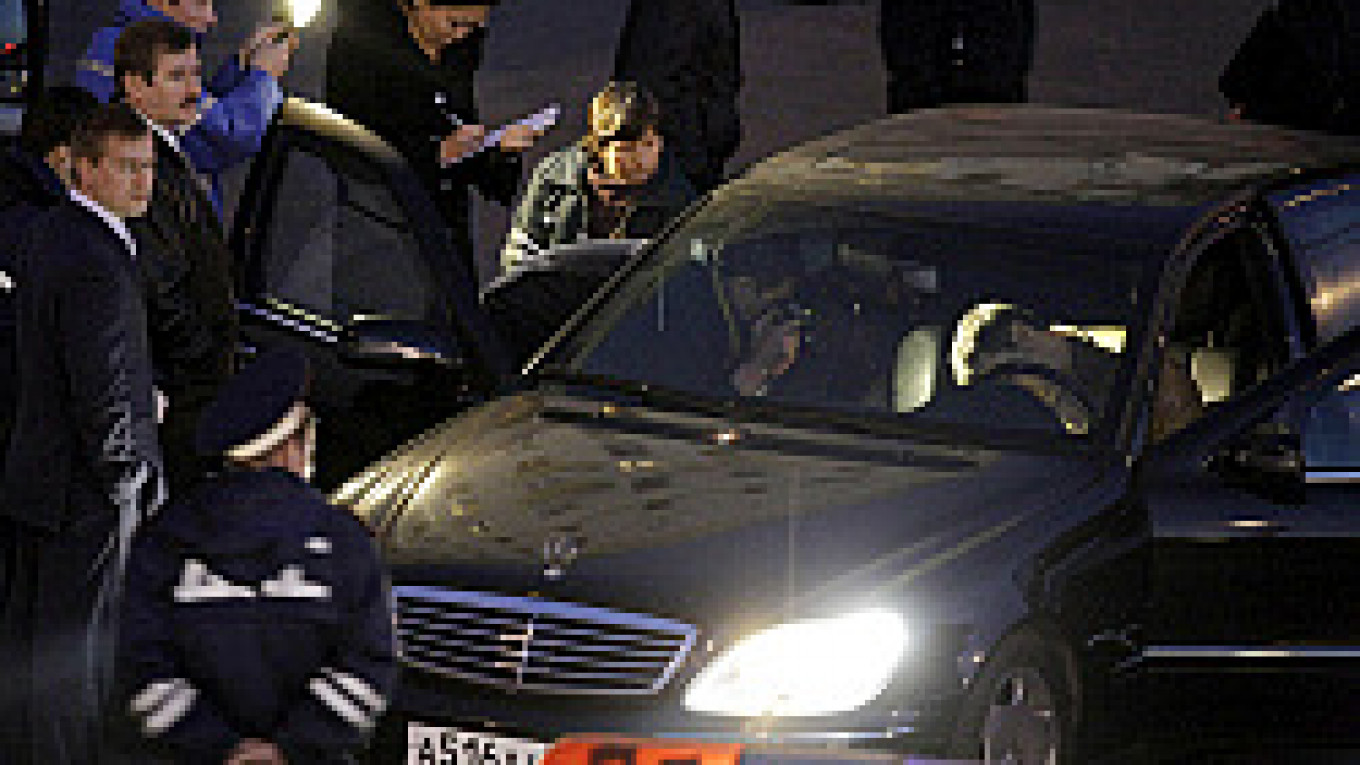An unidentified attacker walked up and fired a pistol several times into Yamadayev's Mercedes S500 after Yamadayev stopped for a red light at 10 Smolenskaya Naberezhnaya, near the White House, Interior Ministry spokesman Valery Gribakin said in televised remarks.
Yamadayev died on the spot, and his passenger, former military commander for Chechnya Sergei Kizyun, was seriously injured, Gribakin said.
Channel One television showed Yamadayev, wearing a green jacket and white shirt, sitting sprawled back in the driver's seat. The channel said the car belonged to his brother, Sulim, former commander of the special commando battalion Vostok.
The attacker fled in a foreign-made car, Gribakin said. Police were combing the city for an Audi-80 sedan Wednesday night, RIA-Novosti reported, citing sources in the investigation team.
Ten 9-mm bullets fired from automatic weapons were retrieved at the site of the attack, RIA-Novosti said.
Yamadayev, 47, and his brothers Sulim and Badrudi headed a powerful clan that had a falling out with Kadyrov after enjoying warm relations with Kadyrov's father, assassinated Chechen President Akhmad Kadyrov.
A source in the Chechen administration said Kadyrov was upset to learn about Yamadayev's death.
"You know, rumors will start now that he might be involved," the official said by telephone, speaking on condition of anonymity due to the sensitivity of the issue.
Like the Kadyrovs, Yamadayev and his brothers initially supported Chechnya's independence from Russia in the 1990s. They fought against federal troops during the first Chechen war but switched sides during the second military campaign and supported Kremlin efforts to end Chechnya's de facto independence.
With Akhmad Kadyrov, the Yamadayevs arranged for their stronghold ?€” the Chechen city of Gudermes ?€” to be taken over by federal troops without a fight. In return, a grateful Kremlin allowed the Yamadayevs to use their fighters to form Vostok under the auspices of the Defense Ministry. Ruslan and Sulim Yamadayev were awarded Hero of Russia medals for their fight against Chechen rebels.
Sulim Yamadayev was made commander of Vostok, while Ruslan was elected to the State Duma on the pro-Kremlin United Russia ticket in 2003. He was not re-elected in December 2007 in what insiders said was a sign that Chechen authorities no longer wanted him to occupy the high-profile post.
He continued to live in Moscow with Sulim Yamadayev, the Chechen official said.
The Yamadayevs were believed to be the only political and military force in Chechnya capable of acting independently of Kadyrov, who became president in February 2007. Yamadayev's death further cements Kadyrov's grip on Chechnya, said Sergei Markedonov, a Caucasus expert at the Institute of Political and Military Analysis.
A standoff between the two clans culminated in April when a Vostok convoy failed to yield to Kadyrov's motorcade. A furious Kadyrov ordered a crackdown on the Yamadayevs.
Chechen prosecutors opened an investigation into Sulim Yamadayev on murder charges, and he was subsequently put on a wanted list. Kadyrov's press service distributed a flurry of press releases accusing the brothers of organizing extrajudicial killings, torture, extortions and kidnapping. Among the allegations, the brothers were accused of raiding a St. Petersburg company owned by a Chechen businessman and then kidnapping his relatives.
"They had a lot of enemies," the Chechen official said.
However, Kadyrov's efforts to undercut the clan did not stop Sulim Yamadayev from commanding the Vostok battalion during Russia's military operation to push Georgian troops out of South Ossetia in early August, and he granted interviews to the Russian press in South Ossetia.
Shortly after the South Ossetia conflict, Sulim Yamadayev was fired from Vostok, but he also was removed from the Chechen wanted list.
A Message from The Moscow Times:
Dear readers,
We are facing unprecedented challenges. Russia's Prosecutor General's Office has designated The Moscow Times as an "undesirable" organization, criminalizing our work and putting our staff at risk of prosecution. This follows our earlier unjust labeling as a "foreign agent."
These actions are direct attempts to silence independent journalism in Russia. The authorities claim our work "discredits the decisions of the Russian leadership." We see things differently: we strive to provide accurate, unbiased reporting on Russia.
We, the journalists of The Moscow Times, refuse to be silenced. But to continue our work, we need your help.
Your support, no matter how small, makes a world of difference. If you can, please support us monthly starting from just $2. It's quick to set up, and every contribution makes a significant impact.
By supporting The Moscow Times, you're defending open, independent journalism in the face of repression. Thank you for standing with us.
Remind me later.


